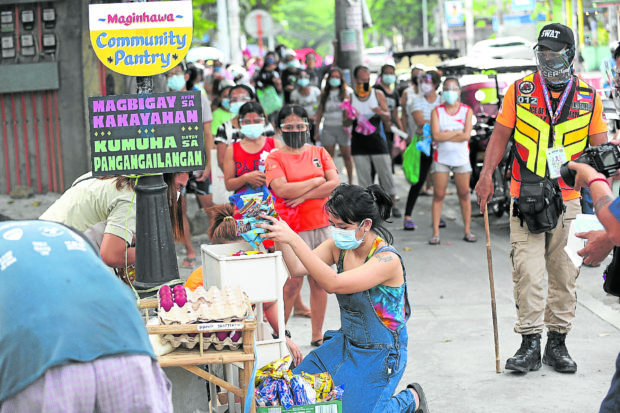PNP apologizes to community pantries for perceived ‘red-tagging, profiling’

People line up to get free food supplies at the Maginhawa community pantry in Teacher’s Village, Quezon City, on Saturday, April 17, 2021, after the project went viral this week as more people donate food stock on a small shelf where underprivileged people can access it but are told to only get what they need. INQUIRER FILE PHOTO / NIÑO JESUS ORBETA
MANILA, Philippines — The Philippine National Police – Human Rights Affairs Office (PNP HRAO) on Wednesday apologized for perceived red-tagging of community pantry organizers, saying there was no intention to “profile” them.
Speaking at the briefing of the House committee on human rights, PNP-HRAO chief Brig. Gen. Vincent Calanoga said that the PNP is not in the business of “red-tagging” or “profiling,” and that any questions foisted by police personnel was only for the sake of their after-patrol report, which they will submit to their superiors.
“‘Yung iba pong insidente kung saan tinawag po na profiling o red-tagging, ay hindi po sakop ng pulisya, ng PNP. Ito po ay binigyan na ng kaukulang aksyon para hindi na ito mauulit,” said Calanoga.
(Incidents which were called profiling or redtagging, are not covered by the national policy of the entire PNP. These actions have been accorded due action so that it will not be repeated.)
“Sa mga naapektuhan po, humihingi po ang PNP ng paumanhin sa mga taong naapektuhan ng kung ano mang balita o naipost na hindi nila nagustuhan,” he added.
Article continues after this advertisement(To those affected, the PNP apologizes to those who were affected by any news or post that they did not like.)
Article continues after this advertisementHe explained that police who asked questions to community pantry organizers were just doing their jobs in monitoring the situation in their respective areas of responsibility.
“‘Yung pagtatanong po naming mga pulis halimbawa ‘yung mga nagpapatrolya sa kalsada, sila po ay ang may katungkulan na alamin ang lahat ng nangyayaring insidente o ano mang aktibidad sa kanilang area of responsibility o sa kanilang beat,” said Calanoga further said.
(Police ask questions because those who patrol are the ones who have the duty to find out all the incidents or any activity in their area of responsibility or in their beat.)
“Kaya po pag ‘’yung ating mga pulis ay nagtatanong, ‘yan po ay para masama po sa kanilang after- patrol report,” he added.
(So when our policemen ask, that’s for them to include it in their after-patrol reports.)
Community pantries popped up in parts of Metro Manila, providing free basic needs including food, rice, and vegetables to those in need. But some of the organizers of these community pantries complained of received threats or of having been profiled.
Among them was Ana Patricia Non, who pioneered the pantry in Maginhawa, Quezon City, and which has since been successfully replicated in many other places in the country, and even abroad.
Non claimed that she, too, had been subjected to numerous threats and had been labelled to have had links to the communist movement by no less than the National Task Force to End Local Communist Armed Conflict, the counter-insurgency arm of the government.